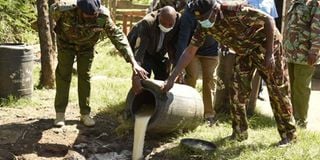More rehab centres urged as illicit alcohol keeps claiming lives

Security officers destroying illicit alcohol during a crackdown in Bondeni, Nakuru. Residents of Molo in Nakuru have called on the government to build rehab facilities and counselling centres in the area to help young people quit alcohol
At midnight on September 30, Elizabeth Wanjiku, a resident of Kasarani in Elburgon, Molo sub-county, was woken up by knocks on her door by two people.
They introduced themselves as her husband’s friends. Her husband lay on the ground, heavily drunk. He could barely talk and wore only a shirt despite the biting cold.
Ms Wanjiku demanded to know what had happened to him. They only told her that they had found him lying in a ditch, drunk.
Ms Wanjiku, who developed a head tumour last year that rendered her immobile after an operation, mobilised her neighbours and they helped take him inside.
“With my condition, I tried to reach the door. I asked them what they did to my husband but they just told me that they found him drunk and decided to bring him home. I had never seen my husband in that condition before though he was a known drunkard in the area.” she said.
Died in hospital
The 54-year-old man was taken to Nakuru Level Five Hospital the next the morning when his situation worsened and he was admitted. But he died 10 days later at the hospital.
“The only thing I remember is that he told me he had been poisoned by those who brought him home, but they distanced themselves, claiming that they found him already drunk,” said the distressed 53-year-old mother of seven.
“Nothing has been done by the government though we have reporting the incident and written statements. I just want to know what really happened.”
Ms Wanjiku said life took a different turn after the death of her husband, with the burden falling on her aged mother and neighbours, who sometimes went to work and left her unattended.
End illicit brew trade
She called on the government to expedite investigations to unravel the cause of her husband's death. She also urged authorities to end the illicit brew business in the area that has claimed the lives of many.
“I need another operation before I can walk completely again. My nerves were paralysed; I cannot walk. My husband used to be my helper. He could wash me and cook for me in the morning before leaving for work,” she said.
“It pains me when I see other people drinking. It always reminds me of my husband. The government should end this menace. We have lost husbands, wives, children and neighbours to the illicit brew and we can’t bear losing more.”
Ann Wairimu, Ms Wanjiku’s neighbour, told the Nation that their husbands have gone as low as stealing utensils, furniture and clothes from their own homes to finance their drinking habits.
One hundred metres from Ms Wairimu’s house, Alice Wangare, a resident of Kasarani, lost her uncle last month to illicit brew. He took his own life after consuming the alcohol.
“I also have a 22-year-old aunt who is so immersed in the drinking of illicit brew that she has neglected her child. We are tired of burying young people every day. Families have been broken. Husbands and even women spend their days in the dens, leaving their children alone,” she said.
Another resident, Michael Mungai, lost his brother, who was a popular DJ, after he fell to peer pressure though he was an ambassador against illicit alcohol.
Build rehab centres
Mr Mungai called on the government to build rehab facilities and counselling centres in the area to help young people quit alcohol, which has rendered them unproductive.
He called for proper parenting and sensitising children against drug abuse while they are still young, urging parents to keep an eye on what their children are doing.
“Excessive consumption of the illegal brews has rendered our youth unproductive, increased domestic and gender-based violence, augmented suicide and murders witnessed all over the country and contributed to cases of mental illnesses,” he said.
“Parents should take full responsibility of their children. They might fall into the trap of peer pressure to try new things and it will be hard to help them once they have been fully consumed,” he added.
Paul Mwangi, a consumer of illicit liquor, said he started drinking after completing high school due to peer pressure from friends, only to plunge fully into it due to frustrations after he dropped out of university. His father, who used to pay his tuition fees, had died.
Wife ran away
Mr Mwangi, a casual labourer in Elburgon, said that his wife ran away with their two children after she failed to help him quit drinking.
“I really want to quit drinking. I will be glad if somebody volunteers to take me to a rehab facility so that I reunite later with my family. I want to be a loving husband and a responsible father,” said Mr Mwangi.
Last week, the government launched a 30-day campaign against illicit brews and narcotics in the wake of deaths from the consumption of outlawed liquor.
Launching the programme, Rapid Response Initiative, in Thika, Interior Principal Secretary Karanja Kibicho said illicit brews have claimed more than 30,000 lives, most of them young people.





